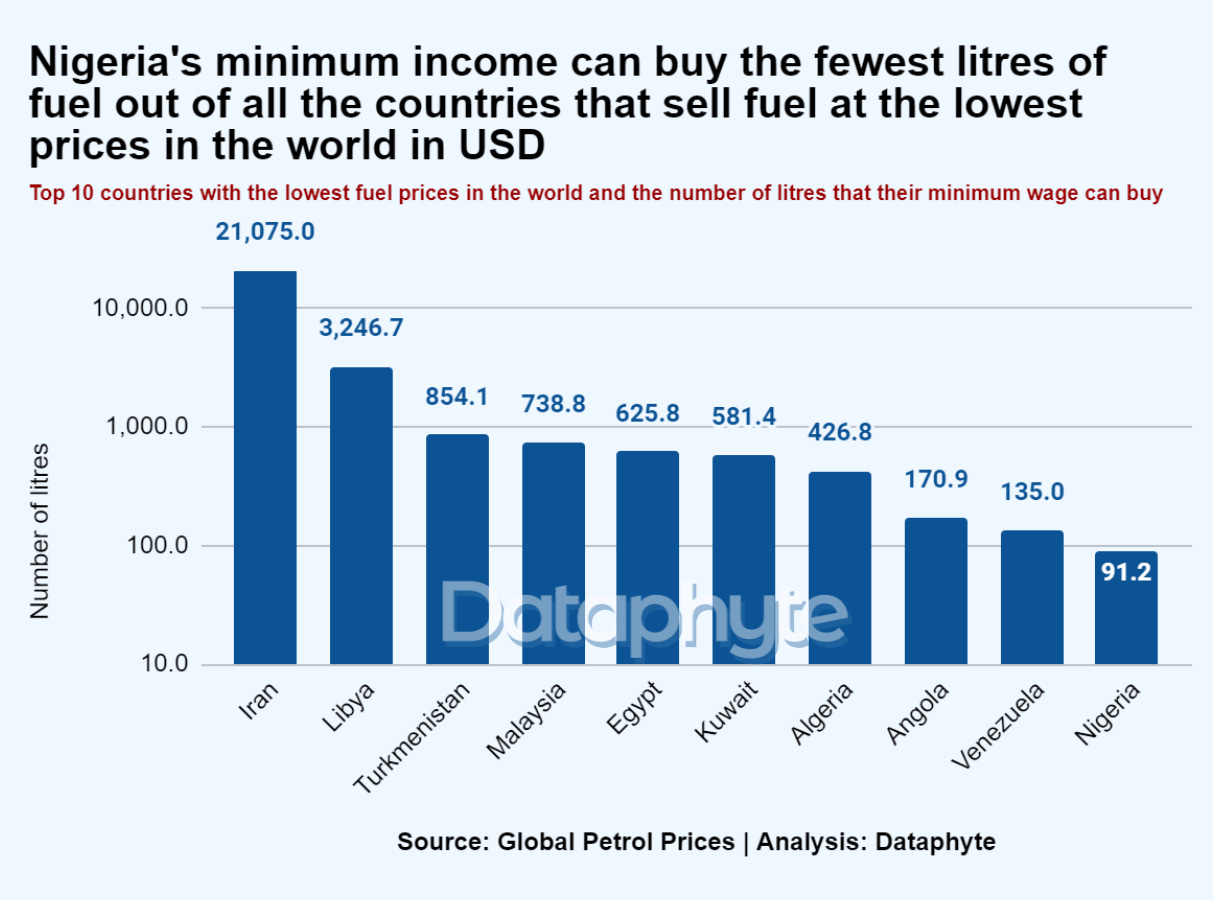Within the past year alone, fuel prices have surged by over 223%, from around N238 per litre in June 2023 to over N770 per litre in July 2024.
With these historic highs, car users are exploring various ways to conserve fuel. One notable adjustment has been the increasing number of drivers opting not to use air conditioning (AC) in their vehicles.
Reports indicate that many believe AC usage significantly increases fuel consumption, especially in light of the removal of fuel subsidies and ongoing scarcity in the fuel market.
How many litres of fuel can Nigerian minimum wage buy?
Nigeria's minimum income can buy the fewest litres of fuel compared to other countries with low fuel prices in USD.
While countries like Iran and Libya offer thousands of litres for their minimum wage, Nigeria's minimum wage only covers 91.2 litres.
Despite relatively low fuel prices in USD, which is due to the weakness of the Naira, the purchasing power of Nigerians is significantly weaker, meaning they can afford much less fuel compared to these other nations.
In the early 2000s, fuel prices were relatively stable, allowing many car owners to use air conditioning without significant concern. However, the post-subsidy era has altered this reality.
According to the U.S. Department of Energy (DOE), the usage of air conditioning can reduce a vehicle's fuel economy – leading to increased petrol consumption – by up to 25% in some cases, especially during hot weather when the AC is working at full capacity.
The International Energy Agency (IEA) adds that in hotter climates, AC usage can account for up to 20% of fuel consumption and in colder temperatures, it can be up to 3%. In severe conditions, such as high temperatures combined with heavy traffic, it can even reach 40%, albeit over shorter periods.
This data emphasises that while reducing AC use can indeed save fuel, the impact varies based on factors such as speed, vehicle type, and external temperature.
Studies consistently show that in stop-and-go city traffic, AC usage can increase fuel consumption by up to 20%.
In Nigeria, where temperatures regularly exceed 30°C and urban traffic is often congested, the effect of AC on fuel consumption becomes even more pronounced.
The surge in fuel prices, driven by the removal of subsidies and compounded by market scarcity, has created an environment where every litre of fuel counts, especially in a country with temperatures regularly exceeding 30°C. The trade-off between comfort and fuel efficiency may not justify the savings.
Additionally, the effectiveness of this practice depends on various factors.
For instance, the U.S. Department of Energy notes that while driving with the windows down at low speeds can reduce fuel consumption, it increases wind resistance at higher speeds, making the vehicle less aerodynamic and requiring more energy to maintain speed.
Therefore, at higher speeds, using the AC may actually be more fuel-efficient than driving with the windows down.
Ultimate guide to navigating fuel economy
To maximise fuel economy in hot weather, the US DOE recommends rolling down windows at lower speeds but using the AC at higher speeds to minimise drag. Avoid overusing the AC or setting it too low, as this significantly increases fuel consumption.
Parking in the shade or using a sunshade can also keep the cabin cooler, reducing the AC’s workload.
Additionally, briefly driving with the windows open before turning on the AC can help ventilate hot air and make the vehicle cool faster with less energy.
Finally, consulting the vehicle’s manual for optimal AC settings and maintaining the system properly can also improve fuel efficiency.
The IEA notes that automotive air conditioning not only consumes more fuel but also contributes to climate change through carbon dioxide emissions. Therefore, reducing AC usage not only saves fuel but also helps to mitigate environmental impact.
In conclusion, while minimising AC use can lead to significant fuel savings, especially in a hot and traffic-congested country like Nigeria, drivers should adopt a combination of strategies, such as managing window usage and optimising AC settings to achieve the best fuel economy.
Luckily, milder temperatures mean that the impact of fewer ACs coming on will not be felt immediately. As temperatures rise from January, however, so will the frustration of overheated motorists.
Thanks for reading this edition of Pocket Science. It was written by Khadijat Kareem and edited by Joachim MacEbong.







